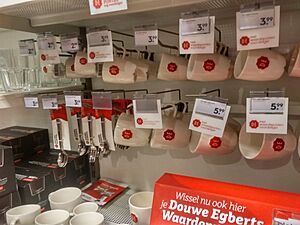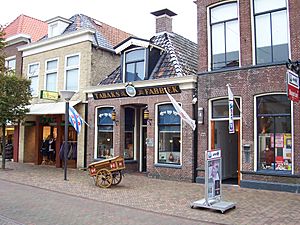Douwe Egberts facts for kids
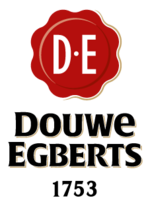 |
|
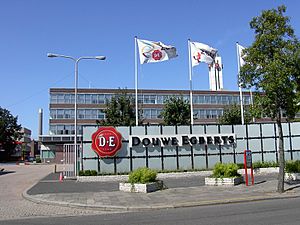
Douwe Egberts building in Utrecht, Netherlands in 2002
|
|
| Type | Coffee |
|---|---|
| Owner | JDE Peet's |
| Country | Netherlands |
| Introduced | 1753 |
| Markets | Worldwide |
| Previous owners | Sara Lee Corporation (1978-2012) |
| Tagline | "No ordinary jar. No ordinary coffee." |
Douwe Egberts is a famous Dutch company that makes coffee and other related products. It is part of JDE Peet's, a big company from the Netherlands that sells coffee and tea all over the world. You can find Douwe Egberts products in many countries, like Australia, Belgium, Hungary, the Netherlands, New Zealand, South Africa, and the United Kingdom.
Contents
The Story of Douwe Egberts
How it All Started (1753–1978)
The story of Douwe Egberts began in 1752 in a town called Joure in the Netherlands. A man named Egbert Douwes opened a small grocery shop there. He called his shop "De Witte Os," which means "The White Ox."
Later, the company started to focus mainly on selling coffee, tea, and tobacco. In 1780, Egbert's oldest son, Douwe Egberts, took over the business. The company then got its current name from him.
In 1925, Douwe Egberts introduced its well-known logo. It is a red seal with the letters "D.E." on it. The company also had a tobacco brand called White Ox, named after the original shop. Douwe Egberts sold this tobacco brand in 1998.
After World War II, the company started selling its products in other countries. In 1948, they began in Belgium. Then they expanded to France, Spain, and Denmark. In 1968, they created a new main company called Royal Douwe Egberts. A year later, they bought another Dutch coffee maker called Kanis & Gunnink. Douwe Egberts continued to grow across Europe, buying other tea, coffee, and tobacco companies.
Joining Sara Lee Corporation (1978–2012)
In 1978, a large American company called Sara Lee Corporation took over Douwe Egberts. In 1989, Douwe Egberts bought Van Nelle, which was its main competitor in the Netherlands for coffee, tea, and tobacco. However, Douwe Egberts sold its tobacco businesses, including Van Nelle's tobacco and Drum rolling tobacco, in 1998.
In 2001, Douwe Egberts worked with Philips to create the Senseo coffee maker. This machine made it easy to brew single cups of coffee. The next year, they started the Douwe Egberts Foundation. This group helps manage coffee and tea projects in the countries where these products are grown.
In 2007, Douwe Egberts had a legal disagreement with the Dutch Province of Groningen. The province wanted coffee machine suppliers to meet certain standards. These included using EKO organic coffee and fairtrade coffee. Fairtrade means farmers get a fair price and extra money for development. Douwe Egberts felt these rules were unfair. However, the Province of Groningen won the case in court. This decision was important because it showed that governments could ask for fair trade coffee in their buying rules. This helps reduce poverty for farmers.
Becoming Independent Again (2012–2013)
By 2012, Douwe Egberts' coffee business faced strong competition from companies like Nestlé. Sara Lee decided to separate the coffee part of its business. They created a new company called D.E Master Blenders 1753. Sara Lee gave shares in this new company to its shareholders. The main Sara Lee company then changed its name to Hillshire Brands.
So, in 2012, Douwe Egberts became an independent Dutch company again. It traded under the name D.E Master Blenders 1753 NV.
Jacobs Douwe Egberts (2013–2020)
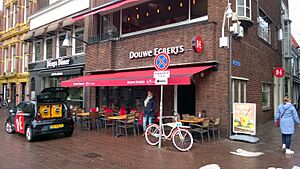
In 2013, a German investment group called JAB Holding Company offered to buy D.E Master Blenders 1753. The company then got new leaders and was no longer listed on the stock market. D.E. Master Blenders 1753 later bought a Norwegian coffee maker called Kaffehuset Friele.
In May 2014, the company announced plans to join with the coffee business of another American food company, Mondelez International. The merger was approved in May 2015. However, there were some conditions. For example, the Merrild and Carte Noire coffee brands had to be sold. Also, the Senseo brand in Austria had to be licensed to a competitor.
JDE Peet's Today (2020–)
In 2020, Jacobs Douwe Egberts joined with Peet's Coffee. Peet's Coffee was another coffee business owned by JAB Holding. Together, they formed a new company called JDE Peet's. This new company now owns the Peet's coffee shops and many other coffee and tea brands. These brands include Jacobs Coffee, Douwe Egberts, Moccona, Kenco, and Pickwick. They also own coffee brewing systems like Senseo and Tassimo.
JDE Peet's was listed on the stock market in Amsterdam in May 2020. The company now makes about €7 billion in sales each year.
See also
 In Spanish: Douwe Egberts para niños
In Spanish: Douwe Egberts para niños
 | John T. Biggers |
 | Thomas Blackshear |
 | Mark Bradford |
 | Beverly Buchanan |


